Individual Winners
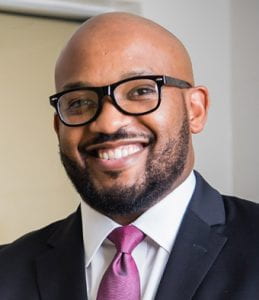 Imhotep Newsome Language Access Program Manager, Metropolitan Police Department
Imhotep Newsome Language Access Program Manager, Metropolitan Police Department
As both an international citizen and a public servant, U.K.-born and Nigerian-raised Imhotep Newsome understands how language barriers, cultural stereotypes and other misperceptions can create friction between immigrant communities and District government agencies. After working in various roles for the District of Columbia Housing Authority, he took on his current position as Language Access Program Manager for the Metropolitan Police Department (MPD) in 2017. He is responsible for ensuring that the department equitably serves residents with limited English proficiency, but he decided to go above and beyond these duties, in order to improve relations between immigrant communities and the local government, especially with regards to law enforcement.
He began by building strategic relationships with the Mayor’s consultative agencies representing immigrant communities—the Office of Latino Affairs (MOLA), the Office of African Affairs (MOAA), and the Office of Asian and Pacific Islander Affairs (MOAPIA). Many members of these communities distrusted MPD because of a mistaken belief that police officers were an arm of the U.S. Immigration and Customs Enforcement Agency and were actively involved in federal deportations. So Imhotep helped to create a social media campaign targeting District residents who speak little to no English, to inform them that MPD representatives don’t ask people about their immigration status.
Next, he surveyed officers and found that the department’s interpretation vendor didn’t certify some West African languages commonly spoken by District residents, as well as by several officers on the force. This finding led MPD to contract with a different company that includes these languages in its bilingual certification program. Imhotep then liaised with the recruiting division
to ensure those languages would also be represented in future outreach efforts.
Imhotep also worked with the three Mayoral consultative agencies to design cultural-competency training for police officers. Imhotep’s approach involved creating a multi-agency, cross-functional team to develop a three-part, video-based training series that features immigrants sharing prevailing stereotypes as well as cultural nuances, to help officers understand them better and communicate with them more effectively.
His next project sought to improve access to interpretation services. This year, Imhotep worked with the telephonic interpreter provider to release a mobile app that immediately connects officers with interpreters at the click of a button. Slated for full department-wide use by the end of the summer, the app is also designed to be tailored, automatically populating each officer’s phone with the languages most often requested by that individual.
“His work has already made a noticeable impact in the relationship between immigrant communities and law enforcement,” says Winta Teferi, the former Director of the Office of Human Rights Language Access Program.
Imhotep “puts forth a remarkable effort to make Washington DC a welcoming and inclusive city for various communities in the District,” according to Aly B. Kaba, Deputy Director of the Mayor’s Office on African Affairs.
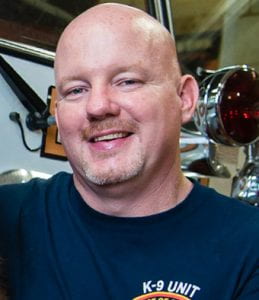 Gene Ryan Sergeant Paramedic, DC Fire and EMS Department
Gene Ryan Sergeant Paramedic, DC Fire and EMS Department
After earning a solid reputation as a paramedic in the New York City region, Gene Ryan was recruited to help shape Washington’s Fire Department-based Emergency Medical Services (EMS) system in 2009. After a few years in his new role, he began noticing some opportunities for improvement, so he took the initiative to comb through public safety data and prepare a series of briefs.
One of his documents—an 86-page paper that caught the attention of the interim fire chief—described, among other things, how firefighters had been unable to search the ruins of an exploded building in Georgetown. The solutions were not obvious, so in 2013, Gene convened a small group of fellow firefighters who decided to accept responsibility for improving outcomes. Their analysis of time-sensitive, high-risk needs revealed that search-and-rescue canines were a top priority.
The Central Intelligence Agency offered to donate two dogs, but the fire department lacked a swift process to accept the donation. Discouraged by this outcome, the group disbanded, but Gene pressed on. He started a nonprofit called Disaster Preparedness DC Incorporated and launched a public speaking tour to raise awareness and funding.
In response to questions about why finding dead bodies would be a priority, he shared a deeply personal experience for the first time. He explained how he and his paramedic partner, Dave Lamagne, had been on duty near the World Trade Center towers when the buildings were struck by terrorists on September 11, 2001. The two men ran to the burning buildings and lost sight of each other. Dave never came out, and more than four months passed before his body was recovered. This gave Gene a better understanding of the additional trauma family members experience when victims’ bodies are never recovered. His empathy and commitment resonated, and within two months, he had raised more than $80,000 for a canine program.
He found a German shepherd named Kylie who was about to be euthanized because of a genetic defect that affected her ability to eat. He saw her potential and (because the donated funds were not enough to cover all expenses) took out a $13,000 personal loan to pay for titanium teeth implants that allowed Kylie to eat again. She joined the fire department and completed thousands of hours of training, which Gene also financed and did on his own time.
Since then, he and Kylie have worked with law-enforcement officials and search-and-rescue personnel to locate dozens of victims in the DC area and beyond, including some who were buried beneath the rubble of collapsed buildings and, in one case, entombed for many years beneath a highway. Gene has often paid his own way to reach the more distant assignments, just for the opportunity to help another grieving family reach closure.
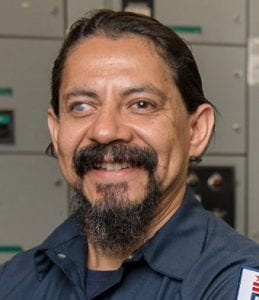 Jose Santos Boiler Plant Operator, Department of General Services
Jose Santos Boiler Plant Operator, Department of General Services
Despite having been recently renovated, Woodrow Wilson High School was having major operational challenges when Jose Santos started working for the Department of General Services (DGS) as a Boiler Plant Operator in 2013. He took on the building’s improvement as a personal challenge, as part of his mission to optimize equipment performance, reduce costs, and lower environmental impacts, which goes well beyond his official job duties to operate and maintain boilers and auxiliary equipment.
He diagnosed and oversaw the correction of some major equipment-programming flaws and ordered repairs for equipment that was not working as designed. Within a year, customer satisfaction had improved, and enough energy was saved to receive the United States Environmental Protection Agency’s ENERGY STAR certification, which has only been awarded to three out of the District’s 400 buildings.
This caught the eye of administrators, who asked Jose to take over responsibility for the Columbia Heights Educational Campus (CHEC), which is one of the biggest users of electricity in the city’s portfolio. The campus was running inefficiently and also experiencing major operational problems, such as heating, ventilation and air-conditioning (HVAC) system leaks that were causing uncomfortable room temperatures and sometimes even causing ceiling tiles to fall out. CHEC proved to be a bigger challenge than Wilson, requiring Jose to work long hours, including from home, to monitor equipment and guide contractors through repairs. His efforts paid off, and the school’s energy bills were cut by 30 percent, saving the city $274,000. To show their gratitude for the cost savings, as well as for major improvements in customer satisfaction, the CHEC administration awarded Jose a Certificate of Appreciation.
While continuing to be stationed at CHEC, in early 2018, Jose was asked to assist the Boiler Plant Operator at Alice Deal Middle School, to try and resolve customer complaints. He fixed programming errors and repaired equipment, reducing the electricity bill by $350,000 that year.
“During these projects, Mr. Santos has demonstrated remarkable leadership in pursuing new and innovative strategies to achieve these aims and in the process, helped create a replicable model that is being applied to dozens of other existing buildings,” netting at least $900,000 a year in savings across the entire portfolio, says Jamie Donovan, an Energy Specialist for the Department of General Services. “Though energy consumption was neither in his job description nor part of his performance review, he leapt at the opportunity to reduce energy costs. He also sought to improve his own knowledge in this area and mentor his colleague.” He’s now working on becoming a training instructor, “so he can offer this training more widely at DGS and other government agencies.”
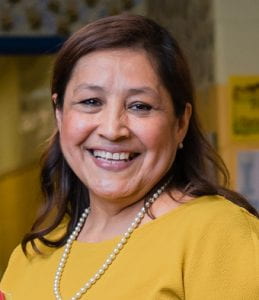 Gloria Torrento Del Cid Administrative Officer, District of Columbia Public Schools
Gloria Torrento Del Cid Administrative Officer, District of Columbia Public Schools
As an immigrant from El Salvador, Gloria Torrento Del Cid is attuned to the struggles of immigrant families whose children attend Seaton Elementary School. Known affectionately to colleagues and students by her middle name,
“Ms. Daisy,” Gloria has worked at the school since 2011, starting out as an Administrative Aide.
Her efforts to develop close relationships with families enable her to identify their needs and mobilize the necessary resources to meet them, even when it means going well beyond her official duties. She has launched several initiatives to ease the lives of families in which the parents may not have stable employment and can’t always provide essentials for their children. She arranged for several groups to provide food and winter coats to children; persuaded a neighboring church to organize a coat drive; and has been running a food bank for the past four years, which she organized in partnership with the Mayor’s office.
As one of the school’s few Spanish-speaking staffers, Ms. Daisy also helps to forge closer links between the school and families, and takes some of the burden off busy teachers. For example, she accompanies teachers on home visits that are designed to break down language and cultural barriers, and help parents see themselves as partners with the teachers to reach common academic goals. She also calls parents and guardians to explain the school’s attendance policy after multiple absences.
The school is very proud of its increasing diversity, which has been advanced by an annual Enrollment Fair, Ms. Daisy helped launch in 2014, to create a way for prospective and current families to get to know each other while enjoying food and games. The Fair has helped boost enrollment by almost 25 percent while also making Seaton an oasis of unity among different cultures and social classes. To that end, Ms. Daisy also plans the annual Multicultural Day, which features events highlighting students’ cultures. She makes a special effort to instill pride in Latino students’ rich cultures, teaching folkloric Salvadoran dances and demonstrating pupusa-making.
Ms. Daisy delights in encouraging and motivating children. She often helps them with homework, rewards them with special pencils, and shows them the same love she feels for her own daughter.
Ms. Daisy “works tirelessly to ensure that our Spanish-speaking families have the same opportunities as all our families,” says Dr. Amanda Alexander, Deputy Chancellor of District of Columbia Public Schools. “She is always willing to translate communication going home to families and attend family meetings to serve as a translator. The comfort and confidence she builds in families significantly contribute to Seaton Elementary’s warm and loving school community. I see her joy reflected in the big dreams that each of our students have and their commitment to achieving those dreams.” She adds that Ms. Daisy’s “work with students, family, and staff cannot be replaced.”
“I rely on Ms. Daisy’s positive attitude and strong relationships to create the safe and culturally responsive environment where students and families can thrive,” says Seaton’s Principal, Suzie Peters Jacobs.
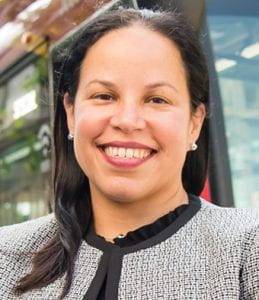 Circe Torruellas Citi-Wide Transportation Planner, District Department of Transportation
Circe Torruellas Citi-Wide Transportation Planner, District Department of Transportation
If you’ve ever relied on clean and convenient DC Circulator buses to get where you’re going, you’ve got Circe Torruellas to thank for it. Until her recent promotion, Circe, a 13-year veteran of the District Department of Transportation (DDOT), served as the DC Circulator’s lead project manager. In that role she managed a multi-disciplinary staff with a mandate to ensure an affordable, comfortable and safe experience for the service’s five million riders per year.
This has come with its share of challenges over the years. In 2015, Circe oversaw the first maintenance audit of the 76-vehicle fleet, which uncovered an average of 3.7 safety defects per bus. Armed with this evidence, she persuaded the Washington Metropolitan Area Transit Authority (WMATA) and the contracted operator to sign off on a plan to ensure adequate contractor staffing, increase weekly reporting, and perform triannual maintenance audits. Thanks to these efforts, the 2018 audit uncovered only 14 safety-related defects across the entire fleet; all of them were resolved within three days.
The 2015 audit also revealed that it would be more economical to replace rather than repair 29 of the oldest buses. Ever innovative, Circe found a source of additional funding and was able to instead purchase 40 new buses. Aside from doubling vehicle availability, the new buses also offered a better rider experience, with new amenities such as free wi-fi, USB ports and electronic message boards. Moreover, 14 of the new buses are battery electric and 26 are diesel hybrid, making this one of the most sustainable bus fleets in the country, and the largest in the Northeast. This is helping to advance the Mayor’s goals to reduce carbon emissions by 60 percent by 2060.
Circe has restructured existing bus routes and launched a new route to better serve riders’ needs. The new National Mall Route, which marks the first time a local-government public-transit agency has provided services within a national park, served more than 478,000 riders in 2018. She took on yet another initiative to try new marketing approaches, including a partnership with the Smithsonian’s National Zoo.
Circe also navigated the bigger administrative challenge of transferring the DC Circulator service’s oversight from WMATA to DDOT, and its operation from one contractor to another. She completed this in about half the time that such transitions typically take, yet without a disruption in service.
Her efforts boost performance and morale across her entire team. “Circe’s dedication to public service and her will to make DC Circulator better has also encouraged her peers to improve their service,” says her former supervisor, Sam Zimbabwe. She “consistently seeks to bring innovative ideas into her work.”
“Circe never hesitates to share her knowledge and expertise with her fellow employees and she never makes them feel like a burden for asking,” adds former colleague Charley Dingboom.
In addition to fostering a positive, collaborative work environment for her own team, Circe has been known to lend a hand to other teams as well. For example, she organized the DC Streetcar’s high-profile launch event.
Team Winner

My School DC Team at the Office of the State Superintendent of Education
(Catherine Peretti, Amy Lerman, Aryan Bocquet, Michele DeSando, Antoinette Williams, Patricia Etienne Payano, Lisvette Garcia Acosta, Michelle Yan)
Families who want their children to attend public schools in the District can either automatically enroll them at their neighborhood school in grades K-12 or apply to charter schools or to traditional schools outside their neighborhood. Because demand is greater than supply for out-of-boundary, pre-kindergarten and charter slots, these assignments are done by lottery. More than 70 percent of the District’s 93,000 public school students go to a school with lottery admission.
However, for many years, a complicated system of separate lotteries, as well as differing applications, timelines and required steps, meant that the process to learn, apply and enroll in schools favored families with greater resources.
District of Columbia Public Schools and public charter schools teamed up to launch the My School DC program in 2014 to simplify this process and make it more accessible and equitable. My School DC features just one application, one website, and a streamlined process for all charter, out-of-boundary and pre-kindergarten assignments. Families needing assistance can call their multi-lingual hotline, visit a My School DC field office, or get online help from a staff member. School and library staff members have also been trained to assist in the process. When it became clear that most parents were using mobile devices, My School DC staff adapted the process to work well on phones and tablets, too.
The team makes it a priority to make information accessible about the program to a wide range of people (e.g., language-minority families and transient youth) through canvassing, phone banks, advertisements, workshops and targeted events. In 2018, My School DC staffed more than 100 events, distributed 50,000 guides, and responded to more than 4,000 hotline inquiries. The key event—the EdFEST, which showcases every school in one place—drew more than 7,000 people last year.
Surveys and parent focus groups have been instrumental in shaping My School DC in a way that meets parents’ needs. The website includes a School Finder section, which offers a range of practical information that families factor into school decisions. For instance, they can learn how long their door-to-door journey would take and see a school’s STAR Framework rating on the DC School Report Card as well as a list of any special programming.
To create this platform, competition between traditional and charter schools was replaced with collaboration. My School DC is governed by a cross-sector board, which is advised by a Parent Advisory Council, comprised of representatives from all eight wards. The team relies on both technology and outreach to maximize the matching of students to their most-preferred schools.
“Ward-by-ward breakdown of the applicant pool matches overall student enrollment, suggesting that families across the city have been able to navigate the common lottery process,” says Hanseul Kang, the State Superintendent for Education. “My School DC has now run six full enrollment cycles without operational lapses, which is remarkable for a public initiative with this level of reach and scrutiny.”
The initiative has become a national model for informing families and placing children in schools.
18th Annual Cafritz Awards Finalists
Individuals
- Elba M. Garcia-Fiallo Executive Director, Language Acquisition Division, District of Columbia Public Schools
- Grace Manubay Environmental Literacy Coordinator, Office of the Superintendent of Education
- Sean O'Donnell Supervisory Financial Examiner, Department of Insurance, Securities and Banking
- Ramona Quillet Attorney Advisor, Office of the Tenant Advocate
- Eva Reid Information Technology Specialist, Office of the Chief Technology Officer
- Marshelle Richardson Chief Risk Officer, Office of the Chief Financial fficer/Office of the Chief Risk Officer
- John Sandy Program Manager, Department of Youth Rehabilitation Services
- Amber A. Sturdivant Supervisory Environmental Protection Specialist (Branch Chief), Department of Energy and Environment
- James Thomas Law Enforcement Officer, Metropolitan Police Department
- Desiree Williams Supervisory Service Coordinator, Department of Disability Services
Teams
- Healthful Food Access Initiative Team
District of Columbia Department of Health
(Djinge Lindsay, Amelia Peterson-Kosecki, Michael Segal ) - Family Support Team
Metropolitan Police Department
(Gregory Alemian Sr., Jefferey Colleli, Brett Parson) - PaveDC Team
District Department of Transportation
(Arturo Arias-Fernandez, Meghan Marie Fowler-Finn, Michaud Gray, Blake Holub, Donise Jackson, Ty'on Jones, Andrew Kaufmann, Ting Ma, Lakiera Spicer, Amanda Ware) - South Capitol - Core Team
District Department of Transportation
(Ra'Adia Cloyd, Joseph Dorsey, Lacrecia Fields, Clifford Lowery, Delmar Lytle, Errol Williams) - Tiny House in Action Team
DC Department of Housing and Community Development
(Dennis Chestnut, Stanley Fields, Shelly Karriem, James Killette, Lauren Linville, Latrena Owens, Paula Ralph, Chantese Rodgers, Michael Woodson)

